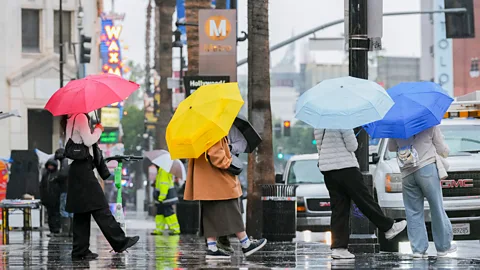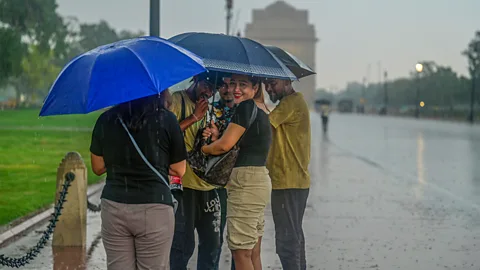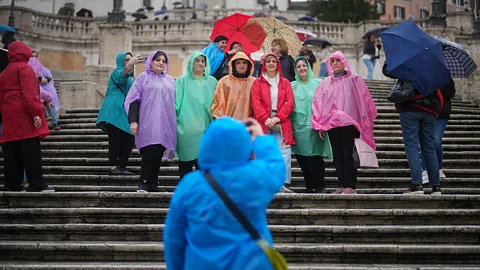How to 'weatherproof' your next holiday
 Getty Images
Getty ImagesBeyond extreme weather or medical emergencies: some insurers now offer payouts for rain, heatwaves or "inconveniences" that spoil your trip.
The 18 hikers who flew into Nepal in September 2024 were prepared for the trek of a lifetime: a journey to Everest Base Camp. But just a day before their flight to Lukla, heavy rain began falling across the Kathmandu Valley.
"Within 24 hours, the capital recorded its heaviest rainfall since 1970," said Balaram Thapa, CEO of Nepal Hiking Team, who was leading the trek. "Roads were submerged, bridges damaged, and all Lukla flights were grounded for a full week. We were never in immediate danger, but the trip became impossible."
Though some of the hikers had travel insurance that reimbursed them for expenses like cancelled flights or additional hotel nights in Kathmandu, none of their policies would have covered the full cost of a completely rained-out bucket list trip.
That might soon change.
 Getty Images
Getty ImagesAs extreme weather events grow more frequent – from torrential rain in India to scorching heatwaves in Europe – a new type of travel insurance is emerging. These protections go beyond covering catastrophes, offering compensation for milder but still trip-ruining weather events like extreme rain or heat.
"The thing that people really worry about in most cases is their trip being rained out," said Daniel Price, co-founder of WeatherPromise, a company that offers their global customers payouts if it rains more than a set number of hours during a booked stay. "The number one factor that causes someone to come back and say 'that wasn't a great trip' is if it pours and you didn't get to sit on the beach [like you'd planned.]"
The company, which also recently partnered with Marriott's Home and Villas brand to offer rain protection, is now exploring coverage for extreme heat, spurred by recent heatwaves across Europe and the US.
"What [we're] about is really giving people the confidence, the comfort and the ability to travel all over at different times of the year," said Price.
 Getty Images
Getty ImagesIt's all part of a wider shift in the travel insurance industry. Since the Covid-19 pandemic, travellers have increasingly opted to take out coverage. And while traditional policies remain geared towards covering big, unexpected disruptions like hospitalisation or cancelled flights, new products are catering to travellers who want more flexibility – and more peace of mind.
These new offerings can range from flat-rate payments for "travel inconvenience," such as missing a scheduled port on a cruise ship through no fault of your own, to coverage that allows cancellations for any reason at all; an add on service which has become increasingly popular post-Covid-19.
"For example, a traveller may be accustomed to certain conditions like having air conditioning in their hotel," explained Chrissy Valdez, senior director of operations for travel insurance comparison site SquareMouth. "So, it may come as a surprise when they check into their hotel in Europe [and] the air conditioning is not working, or there is no air conditioning. [But] there are benefits that would allow them to interrupt their [trip] because they're just not comfortable where they're staying."
Still, not all expanded policies are equal. What is covered and what is required to file a claim varies by provider. Therefore, it's still important for travellers to check the fine print, including confirming things like what weather qualifies, how much rain counts and what documentation is needed to make a claim.
Valdez also warned that as unexpected weather becomes the norm, some insurers may tighten their coverage definitions.
"There are underwriters looking at the definition of 'extreme' weather or 'inclement' weather," she said. "I can't say for certain if this is going to benefit the consumer or if they're going to look at it as a higher risk and possibly define those things even stricter than what they do today."
With unpredictable shifts in weather patterns only expected to continue, these new insurance products may offer at least some protection against the frustration of a ruined trip.
"As a Himalayan trek leader with over 20 years of experience, I'm seeing this type of disruption happen more often," said Thapa. "[It seems that] travel insurance is still catching up to what 'disruption' really means."
--
If you liked this story, sign up for The Essential List newsletter – a handpicked selection of features, videos and can't-miss news, delivered to your inbox twice a week.
For more Travel stories from the BBC, follow us on Facebook, X and Instagram.
